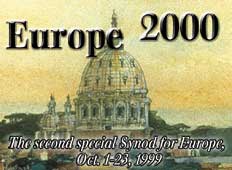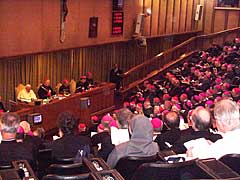

 |
 |
|
|
Synod history reveals more form than substance 
The European synod, on the topic “Jesus Christ, Alive in His Church, Source of Hope for Europe,” is the 19th synod since they were initiated in the wake of the Second Vatican Council. At that time they were envisioned as a means of sharing the governing authority of the Catholic church. Progressive bishops hailed them; conservatives, especially members of the Roman curia, were not warm to the idea. In the years that followed, control of the synods was seized by curial members and held by them ever since. They have been tame and unthreatening events, for the most part. This is in large measure because virtually every step of the synod is highly controlled, so much so that some bishops no longer want to have anything to do with them. At best, they allow bishops to hear each other’s voices in ways otherwise not accessible. At worst, they are a waste of time. More than one observer here has remarked on the irony of having a synod on the proclamation of “Jesus Christ as Hope for Europe,” but keeping the press out and the bishops’ speeches under lock and key. Asked by NCR if he did not think this odd, Bishop Jozef Miroslaw Zycinski, archbishop of Lublin, Poland, and special secretary of the synod, said he felt the press should be grateful to get summaries of the interventions. Asked if he thought synod reforms might be in order, Zycinski said institutional reforms wouldn’t help the church, only more vigorous theology will. The Vatican-chosen leaders of this synod appear unwilling to engage in dialogue beyond a fairly closed episcopal setting. They appear cut off from the world going on outside the synod hall. But hope springs eternal. Discussions are continuing inside the synod. Curiously, those who control the synod view the idea of collegiality, or any consideration of reform in the synod process, as somewhat subversive. Thus, Cardinal Carlo Maria Martini’s intervention last week in which he called for greater collegiality in church matters, never made the list of 17 topics, distilled by synod organizers and offered to the language groups as topics for further discussion. The conservatives run the show. No one here expects that to change as Pope John Paul, who is said to have only four “good” hours left in him a day, focuses his dwindling energies on preparing for trips and for Jubilee celebrations set to begin Christmas eve and run through the Epiphany of the year 2001. Perhaps the synods, as currently constituted, have run their course. Quite likely, the topic of synods will be on the list of ecclesial issues facing the college of cardinals as it gathers to elect the next pope. The current European synod is the 19th synod since Vatican II. One more synod is scheduled, probably for next October. That synod is supposed to be the culmination of the regional synods covering the Americas, Africa, Asia, Oceania and Europe. Next year’s synod will deal with the role of bishops and, could, if allowed, take up the critical issue of church governance, seen by an increasingly larger section of the hierarchy as having reached an unhealthy imbalance. Pope John Paul II has centralized church decision-making as no other pope in recent times. During this pontificate, most synods have ended with the bishops involved writing a series of recommendations which are handed on to the pope. Months later, sometimes as much as a year, he responds in a formal declaration What follows is a list of synods since the Vatican council. There are three types of synod: ordinary, extraordinary and special. The ordinary synod is the most common. The extraordinary synods are the least common, having taken place only twice, in 1969 and 1985. In theory, extraordinary synods deal with matters in need of immediate attention. Special synods deal with matters concerning a particular region or nation. 1. The First Ordinary General Assembly from 29 September - 29 October 1967, on the topic “Preservation and strengthening of the Catholic faith, its integrity, its force, its development, its doctrinal and historical coherence”; 2. The First Extraordinary General Assembly from 11 - 28 October 1969, on the topic “Cooperation between the Holy See and the Episcopal Conferences”; 3. The Second Ordinary General Assembly from 30 September - 6 November 1971, on the topic “The Ministerial Priesthood and Justice in the World”; 4. The Third Ordinary General Assembly from 27 September - 26 October 1974, on the topic “Evangelization in the Modern World”; (Pope Paul VI published Apostolic Exhortation Evangelii nuntiandi on 18 December 1975); 5. The Fourth Ordinary General Assembly from 30 September - 29 October 1977, on the topic “Catechesis in our Time”; (Pope John Paul II published Apostolic Exhortation Catechesi tradendae on 16 October 1979); 6. Special Assembly for the Netherlands from 14 - 31 January 1980, on the topic “The Pastoral Situation in the Netherlands”; 7. The Fifth Ordinary General Assembly from 26 September - 25 October 1980, on the topic “The Christian Family”; (Pope John Paul II published Apostolic Exhortation Familiaris consortio on 22 November 1981); 8. The Sixth Ordinary General Assembly from 29 September - 29 October 1983, on the topic “Penance and Reconciliation in the Mission of the Church”; (Pope John Paul II published Apostolic Exhortation Reconciliatio et Poenitentia on 2 December 1984); 9. The Second Extraordinary General Assembly from 25 November - 8 December 1985 on the topic “The Twentieth Anniversary of the Conclusion of the Second Vatican Council”; 10. The Seventh Ordinary General Assembly from 1 - 30 October 1987, on the topic: “The Vocation and Mission of the Lay Faithful in the Church and in the World”; (Pope John Paul II published Apostolic Exhortation Christifideles laici on 30 December 1988); 11. The Eighth Ordinary General Assembly from 30 September - 28 October 1990, on the topic “The Formation of Priests in Circumstances of the Present Day”; (Pope John Paul II published Apostolic Exhortation Pastores dabo vobis on 25 March 1992); 12. Special Assembly for Europe from 28 November - 14 December 1991, on the topic “So that we might be witnesses of Christ who has set us free”; 13. Special Assembly for Africa from 10 April - 8 May 1994, on the topic “The Church in Africa and Her Evangelizing Mission Towards the Year 2000: ‘You Shall Be My Witnesses’ (Acts 1:8)”; (Pope John Paul II published Apostolic Exhortation Ecclesia in Africa on 14 September 1995); 14. The Ninth Ordinary General Assembly from 2 - 29 October 1994, on the topic “The Consecrated Life and Its Role in the Church and in the World”; (Pope John Paul II published Apostolic Exhortation Vita consecrata on 25 March 1996); 15. Special Assembly for Lebanon from 26 November - 14 December 1995, on the topic “Christ is Our Hope: Renewed by His Spirit, in Solidarity We Bear Witness to His Love”. (Pope John Paul II published Apostolic Exhortation Une Esperance nouvelle pour le Liban on 10 May 1997); 16. Special Assembly for America from 16 November - 12 December 1997, on the topic “Encounter with the Living Jesus Christ: the Way to Conversion, Communion and Solidarity in America”; 17. Special Assembly for Asia, from 19 April - 14 May 1998, on the topic “Jesus Christ the Savior and His Mission of Love and Service in Asia: ‘...That They May Have Life, and Have it Abundantly’” (Jn 10:10). 18. Special Assembly for Oceania, from 22 November - 12 December 1998, on the topic “Jesus Christ and the Peoples of Oceania: Walking His Way, Telling His Truth, Living His Life”. 19. Second Special Assembly for Europe, from 1 - 23 October 1999, on the topic “Jesus Christ, Alive in His Church, Source of Hope for Europe”; 20. Tenth Ordinary General Assembly, Jubilee of the Year 2000, on the topic “The Bishop: Servant of the Gospel of Jesus Christ for the Hope of the World”. Tom Fox may be reached at TCFOX@aol.com National Catholic Reporter, October 14, 1999 |